Dangerous sugar: is it in watermelon?
Who doesn't want to eat sweets and lose weight? Watermelon gives this opportunity. It is low-calorie, healthy, gives a feeling of satiety, relieves the body of toxins and toxins, as well as a source of iron, calcium, magnesium. The question arises: is there sugar in a sweet berry and what is the secret of losing weight on a watermelon diet?
In the article, we will consider how much sugar watermelon contains, its calorie content, whether it can be used as a weight loss product, whether it is harmful to people with diabetes, what contraindications and possible side effects exist.
The content of the article
The chemical composition of watermelon
Fruit pulp contains 92% water, dietary fiber, digestible carbohydrates, amino acids, fats, a complex of vitamins (retinol, beta-carotene, B, E, K), nicotinic, folic and ascorbic acids, mineral salts (calcium, potassium, magnesium, iron, phosphorus) , alkaline substances.
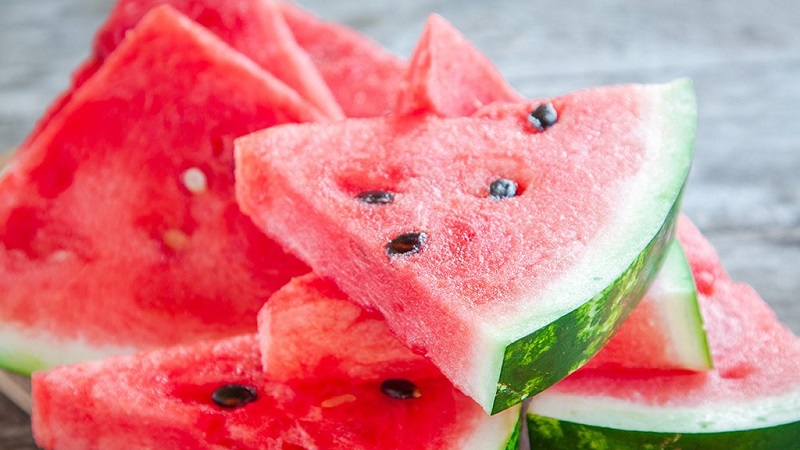
How much sugar is in watermelon
Does watermelon contain sugar? Yes, absolutely. The edible part contains from 5.5 to 13% of easily digestible carbohydrates (fructose, sucrose, glucose). The sugar content of a watermelon depends on the variety, growing and storage conditions, and the degree of maturity. By the time of ripening, glucose and fructose predominate in the composition, and only during storage does sucrose accumulate.
The sugar content in watermelon varies from 6-10 g, of which fructose - 4.3 g, glucose - 2.4 g, sucrose - 2 g. That is, in 200-300 g of fruit pulp there is only 20-30 g of sugar. But if you eat 0.5-1 kg of watermelon at a time, then it will already be 50-100 g of sugar.
Calorie content
The main plus of watermelon for weight loss is its low calorie content.: 27 kcal per 100 g. The berry contains practically no fat (0.1 g), but is rich in carbohydrates (5.8 g) and proteins (0.7 g).
Doubts about whether watermelon can be consumed as a weight loss product is associated with a high glycemic index (GI). For a watermelon, it is 75 units. When foods with high GI enter the digestive tract, they are digested quickly and raise blood sugar levels, stimulating the release of the hormone insulin, which lowers glucose concentration.
Despite the high glycemic index, the diuretic effect of watermelon pulp allows you to use it for weight loss. Fruits well cleanse the intestines of toxins, normalize metabolism, remove excess fluid, which reduces puffiness. There are varieties of the watermelon diet, with which you can achieve excellent results - minus 10 kg in 10 days.
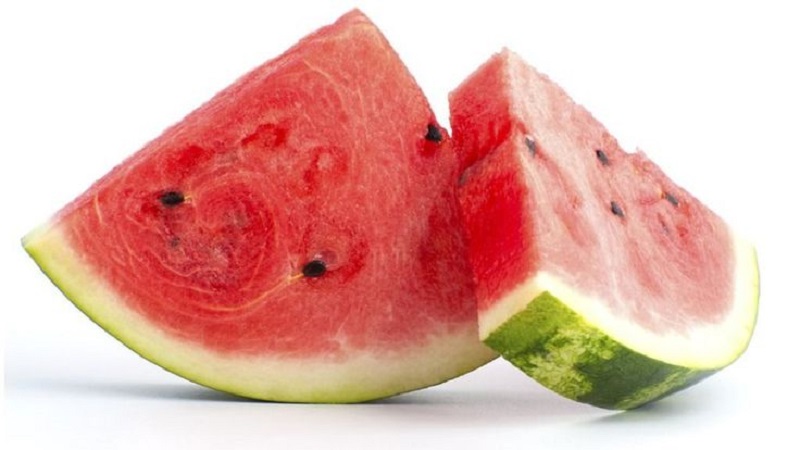
Berry properties
Watermelon pulp has a pronounced diuretic, carminative, anti-inflammatory, antispasmodic, antipyretic effect. Watermelon helps with constipation to normalize stools, facilitate bowel movements. It also fights kidney and liver diseases, stabilizes high blood pressure to normal levels, activates metabolic processes, relieves muscle pain, and reduces weight.
The berry has a beneficial effect on the activity of the organs of the cardiovascular system, the endocrine glands.
For reference. Watermelon is used in medical nutrition for the detection of stones in the gallbladder, anemia, uric acid diathesis.
Eating low-quality watermelon, especially in large quantities, even in a healthy person can provoke health problems... Consider the benefits and possible harm of fruit pulp for the body.
What is useful for the body
The unique properties of watermelon help improve health in general, affect the course of certain diseases, minimize the likelihood of pathologies from the heart, blood vessels, gastrointestinal tract, liver, kidneys, and nervous system.
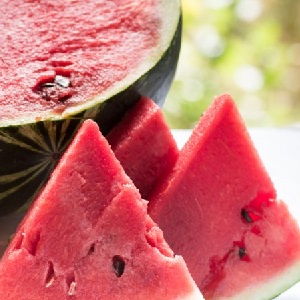 Vitamin C increases the body's resistance: protects against influenza, upper respiratory tract infections, increases the density and elasticity of the vascular walls, reducing their permeability, plays an important role in the formation of connective and bone tissues.
Vitamin C increases the body's resistance: protects against influenza, upper respiratory tract infections, increases the density and elasticity of the vascular walls, reducing their permeability, plays an important role in the formation of connective and bone tissues.
Large amount of iron - good prevention of anemia. Watermelon increases body tone and potency. Folic acid (vitamin B9) improves the functionality of the nervous system, normalizes fat metabolism, lowers cholesterol levels, which is important for people suffering from hypertension.
Watermelon is recommended for use with pathologies liver and kidneys, arterial hypertension, coronary heart failure and other diseases accompanied by edema. The fact is that the fruit pulp enhances the outflow of urine, without creating an additional load on the kidneys.
At the expense of diuretic action watermelon quickly removes from the body slags, toxins, excess fluid, reduces peripheral vascular resistance, reduces the load on the heart muscle.
Large dose of vitamin A in the edible part has a positive effect on health. The main functions of the vitamin:
- slows down the aging process;
- stimulates the production of steroid hormones;
- neutralizes aggressive free radicals, inhibits oxidative processes;
- plays an important role in the formation of new cells;
- moisturizes the eyes, protects against drying out, provides night vision;
- reduces the risk of cancer;
- participates in the formation of new cells.
According to nutritionists, with the help of watermelon pulp, you can get rid of extra pounds in a few days.
How does weight loss occur? Watermelon contains fiber that helps cleanse the gastrointestinal tract, quickly removes excess fluid from the body, eliminates edema, thereby reducing body volume. Plus, it has a beneficial effect on the skin: it becomes smooth, moisturized, beautiful and even in color.
Dietary fibers have a laxative effect, activate digestion, normalize metabolism, and accelerate lipolysis. In addition, pectin fibers, getting into the digestive tract, swell, take up all the free space, which ensures fast saturation, allows you to reduce the volume of the next portions, and refuse snacks.
For reference. Frequent consumption of watermelon in moderation has a beneficial effect on mood, increases endurance and performance, which leads to stimulation of physical activity and additional burning of calories.
Harm and contraindications
 Side effects are related to the nitrate-accumulating properties of watermelon... Once in the body, they are converted to nitrosamines and nitrites. These are highly toxic compounds that affect the liver, causing involuntary muscle contractions and hemorrhages. They are carcinogenic and increase the likelihood of cancerous growths.
Side effects are related to the nitrate-accumulating properties of watermelon... Once in the body, they are converted to nitrosamines and nitrites. These are highly toxic compounds that affect the liver, causing involuntary muscle contractions and hemorrhages. They are carcinogenic and increase the likelihood of cancerous growths.
Eating watermelons stuffed with nitrates, can cause food poisoning. People complain of nausea, vomiting, diarrhea, stomach pains, dizziness, double vision.
Harmful to health immature or overripe fruits... With long-term storage, the taste, nutritional and useful properties of watermelon change, it loses some of its beneficial compounds and becomes toxic to the human body. Green fruits can also be harmful to health: they do not have time to process nitrate substances and can provoke poisoning.
Council. Melon growers do not recommend buying watermelons before mid-August. The time from August to September is the period of their biological maturation in nature.Buying a watermelon early, there is a high probability of seeing a product generously stuffed with nitrates on the table.
When using watermelon, there are contraindications... Among the absolute ones is an allergy to fruits.
Due to the presence in the composition of amino acids that irritate the mucous membrane, it is recommended to use it with caution in some diseases of the gastrointestinal tract. Among them are gastritis with high acidity, gastric ulcer and duodenal ulcer. You can not include a watermelon in the diet with a tendency to abdominal bleeding, the formation of large stones in the urinary system.
To special groups of people whose health the fruit pulp can be harmful, include patients with diabetes mellitus. Children, elderly people, breastfeeding women should also use watermelon with caution.
It can be useful:
How to choose a ripe and sweet watermelon
Is it possible to eat watermelon with diabetes
People with diabetes should understand that the fructose or glucose contained in watermelon, sucrose can affect the course of the disease. Due to the low content of plant fiber, fructose is not fully absorbed, which contributes to a rapid increase in blood sugar levels. Sharp fluctuations in sugar cause life-threatening conditions: hyper- and hypoglycemic coma.
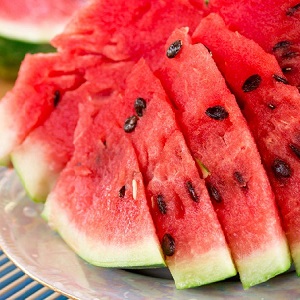 But there is a downside to the coin when watermelon may benefit mild to moderate diabetes... It supports and restores skin cells, ensures conductive work of the heart, increases the elasticity and strength of the vascular walls, inhibits oxidative processes, which has a beneficial effect on the course of the disease.
But there is a downside to the coin when watermelon may benefit mild to moderate diabetes... It supports and restores skin cells, ensures conductive work of the heart, increases the elasticity and strength of the vascular walls, inhibits oxidative processes, which has a beneficial effect on the course of the disease.
Besides, watermelon - a source of magnesium, which activates intestinal peristalsis, lowers blood cholesterol levels, serves as a good prevention of gallstone formation.
Allowable single serving and daily allowance depend on the stage diabetes mellitus, the severity of symptoms, age and gender, the presence of contraindications and concomitant diseases.
Type 1
With a mild degree of the disease, it is permissible to consume watermelon in limited quantities... A single serving averages 100-200 g, the frequency is several times a day. The daily rate should not exceed 400-800 g.
The even distribution of carbohydrates allows you to maintain the basal metabolism and stable blood glucose levels, respectively, to minimize the risk of exacerbations.
2 types
The development of diabetes mellitus of moderate severity dictates to reduce the portion of fruit pulp to 100 g, and the daily rate is up to 300 g. Even a small amount of watermelon pulp can provoke a sharp rise in blood glucose. Therefore, people with type 2 diabetes mellitus need constant treatment and control of their blood glucose levels.
How much can you eat per day
All depends on health status and goals... For weight loss, a healthy person is recommended to eat 1 kg of ripe pulp per day per 10 kg of body weight. In this case, it is necessary to exclude all carbohydrates - you can only water, green tea, rye, whole grain or bran bread.
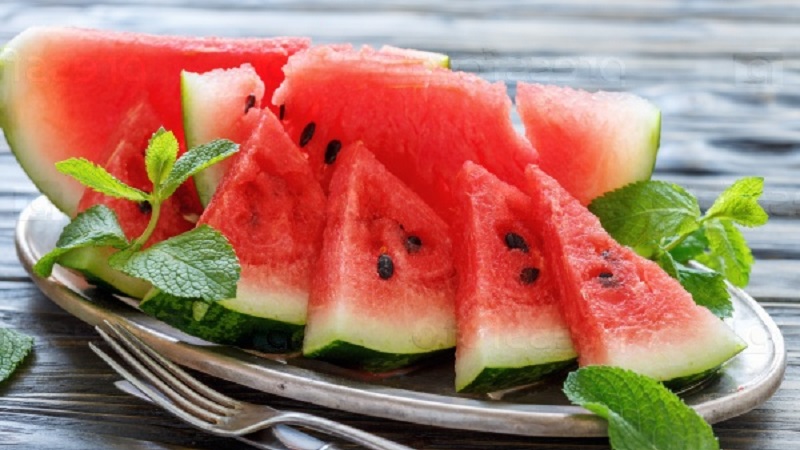
In a typical diet, the average serving of watermelon for an adult, having no health problems, is 250-300 g, for patients with diabetes mellitus - 100-200 g (depending on the severity of the disease).
Conclusion
Watermelon is a valuable food product. Although the percentage of sugar in it is not so small - the indicator is 13%, nevertheless, with moderate consumption, the fruit will bring great benefits to the body.
The berry is a source of a complex of minerals and vitamins. It improves heart function, normalizes the functions of the urinary system. In addition, it has a low calorie content, does not contain fats, therefore it is considered an excellent dietary product.